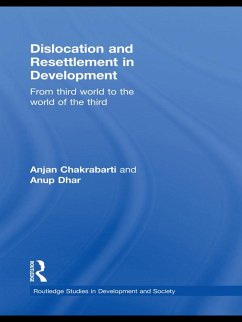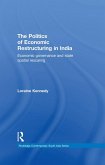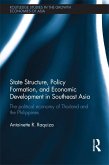Interrogating the 'reformist-managerial' and 'radical-movementist' approaches, it historicizes and politicizes the event of dislocation as a moment to usher in capitalism through the medium of development. Such a framework offers alternative avenues to rethinking dislocation and resettlement, and indeed the very idea of development. Arguing that dislocation should not be seen as a necessary step towards achieving progress - as it is claimed in the development discourse - the authors show that dislocation emerges as a socio-political constituent of constructing capitalism.
This book will be of interest to academics working on Development Studies, especially on issues relating to the political economy of development and globalization.
Dieser Download kann aus rechtlichen Gründen nur mit Rechnungsadresse in A, B, BG, CY, CZ, D, DK, EW, E, FIN, F, GR, HR, H, IRL, I, LT, L, LR, M, NL, PL, P, R, S, SLO, SK ausgeliefert werden.









